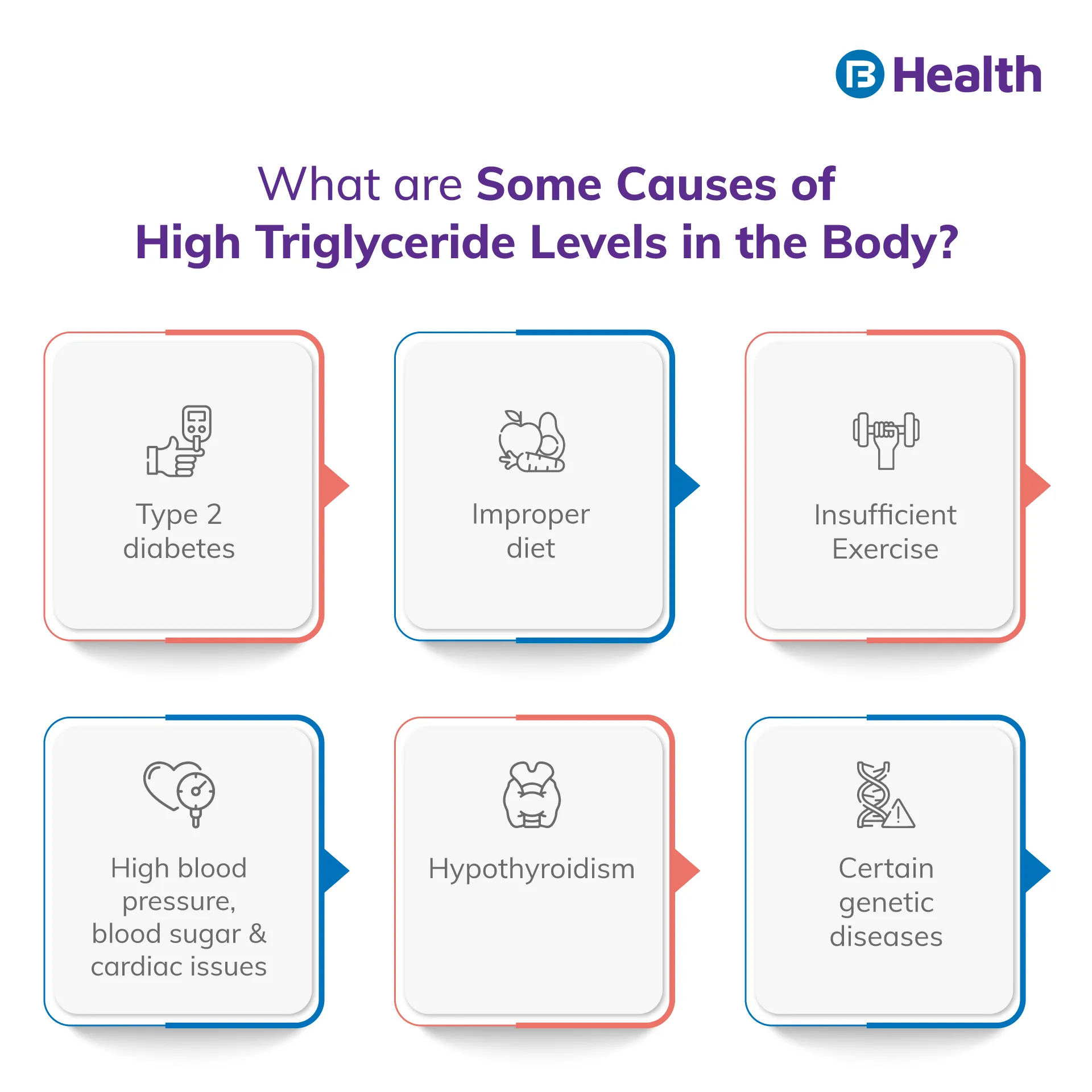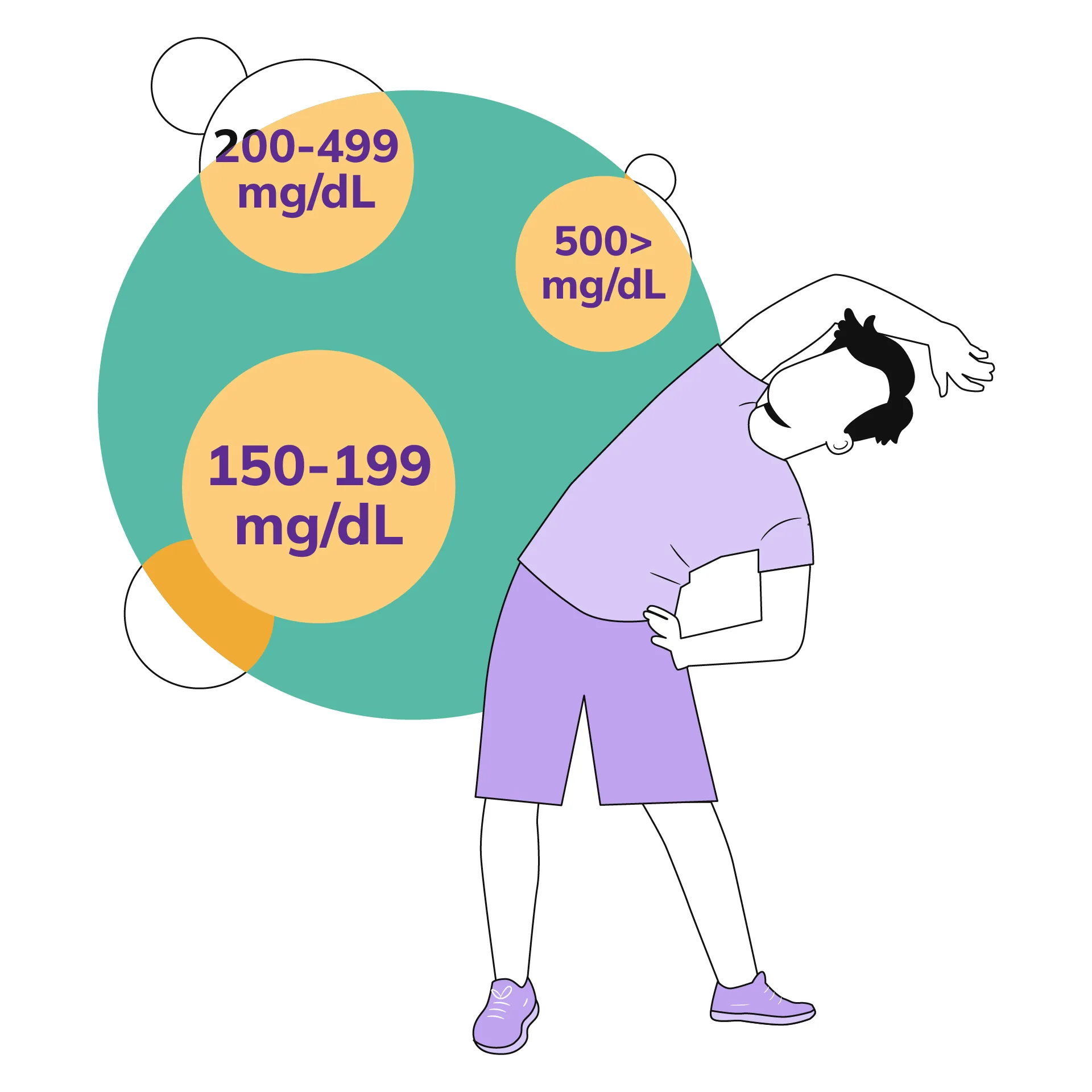General Health | 6 min read
Easy Ways to Lower Your Triglycerides Naturally
Medically reviewed by
Table of Content
Synopsis
Triglycerides are lipids or fats that the body needs for energy. It may be produced in the body or obtained from the foods you consume, but is a high Triglyceride level in the body good for you? Not at all; it is rather risky to sustain with this condition. Thus, this article talks about this condition and also the ways you should follow to get rid of high triglyceride levels in the body.
Key Takeaways
- Triglycerides are needed for gaining energy but, if found in excess, can result in various bodily issues
- A healthy lifestyle and proper diet should be followed to lower the triglyceride level in the body
- Triglyceride levels can become high due to genetic causes, certain medications, high thyroid levels, etc.
What Are Triglycerides?
Before knowing how to reduce triglyceride levels, it is crucial to know what triglyceride is.
They are lipids (waxy fats) that provide your body energy. Your body produces triglycerides and gets them from the foods you consume, which are carried in the blood. Most of the fats we ingest are in triglyceride form. Excess calories, alcohol, and sugar in the body convert into triglycerides and are accumulated in fat cells across the body. High triglycerides blended with high cholesterol levels increase the chance of getting a heart attack, stroke, and pancreatitis. Diet and lifestyle modifications can retain triglyceride levels in a healthy range. However, it is essential to consult a general physician before starting any diet.
Triglyceride Levels
Knowing the normal triglyceride level in the body is crucial before answering how to reduce triglyceride:
- Normal — Less than 150 mg/dL
- Borderline high — From 150 to 199 mg/dL
- High — From 200 to 499 mg/dL
- Very high — 500 mg/dL and above
Understandably, high triglyceride is destructive to your body. Let’s discuss more of it in detail.

Why Are High Triglyceride Levels Dangerous?
High triglycerides or Hyperlipidemia may contribute to the stiffening of the arteries or thickening of the artery walls called arteriosclerosis — which increases the chance of stroke, heart attack, and other cardiac issues. Excessively high triglycerides can also provoke acute pancreas inflammation, known as pancreatitis.
High triglycerides are usually a sign of other conditions that raise the hazard of heart ailment and stroke, including obesity and metabolic syndrome — a cluster of conditions that includes an accumulation of too much fat near the waist, high blood pressure, high triglycerides, high blood sugar, and unnatural cholesterol levels.
High triglycerides amount in the body can be determined through a blood test that measures the amount of fat in the blood called the triglycerides test.
Some probable reasons that can cause high triglyceride levels in the body are:
- Improper diet
- Insufficient exercise
- Type 2 diabetes
- Hypothyroidism (low thyroid hormone level in the body)
- A metabolic syndrome might drive other complexities like high blood pressure, high blood sugar, cardiac issues, and so on
- Certain genetic diseases may also be the reason
Apart from the reasons mentioned above, high triglyceride levels may be caused due to intake of certain medications like
- Diuretics
- HIV Medications
- Estrogen and progestin
- Retinoids
- Certain immunosuppressants, and many more

How to Reduce Triglyceride: Ten Best Ways
In case you are wondering how to reduce triglycerides naturally, the following are some ways:
1. Aim for a suitable body weight for yourself
Whenever you consume excess calories than your body requires, your body tends to shift those calories into triglycerides and accumulate them in fat cells. Working to achieve an average body weight by ingesting rarer surplus calories can effectively lower your blood triglyceride levels. Studies have revealed that losing 5–10% of your body weight can seriously decrease your triglyceride levels. [1]
2. Restrict your sugar intake
More or less, everyone intakes extra added sugar by consuming food like sweets, fruit juice, etc. But this extra sugar in your diet may be extremely dangerous for your health and may be turned into triglycerides, which can lead to a growth in blood triglyceride levels, along with other heart illness risk factors.
3. Consume fibre in adequate amounts
This is one of the most effective ways that must be mentioned if you want to know how to reduce triglyceride levels. Dietary fibre is found naturally in fruits, vegetables, and whole grains. It is also found in numerous other plant sources, like nuts, seeds, grains, and legumes. Including more fibre in your diet can delay the absorption of fat and sugar in your small intestine, thereby enabling you to reduce your triglyceride levels.
4. Work out regularly
Studies have proven that daily exercising can burn out excess calories you may have consumed. [2] Thirty minutes of exercise five days per week, which may include activities like yoga, walking, jogging, bicycling, swimming, etc., are quite helpful if you are wondering how to reduce triglyceride levels in the body.
Additional Read: Best Yoga Poses for Weight Loss5. Consume fatty fish at least twice a week
How to reduce triglyceride levels? People having high triglyceride levels are advised to eat fatty fish twice a week as they contain certain properties that are known to reduce triglyceride levels in the body.
6. Limit alcohol consumption
Alcohol is usually high in sugar, carbs, and calories. If these calories stay unused, they can be transformed into triglycerides and stored in fat cells. Also, it can boost the synthesis of large, very low-density lipoproteins in the liver, which hold triglycerides in your system. Therefore, alcohol consumption should be limited.
7. Incorporate soy protein into your diet
Soy is rich in isoflavones, a plant compound with multiple health benefits. It is widely known for its function in lowering cholesterol. Soy protein has been known to recede blood triglyceride levels.
8. Include nuts in your daily diet
Tree nuts like almonds, walnuts, pistachios, cashews, Brazilian nuts, pecans, and many more provide a potent dose of fibre, omega-3 fatty acids, and unsaturated fats, all of which operate together to reduce blood triglycerides.
Additional Read: Health Benefits Of Makhana9. Set a regular meal pattern
A normal eating pattern can help prevent insulin resistance and high triglycerides. Several sStudies have confirmed that eating three meals per day greatly diminished triglycerides compared to eating six meals daily.
10. Consume natural supplements
Several natural supplements are known to have the possibility to lower blood triglycerides. Always speak to your doctor before starting any supplements, as they can link with other medications. Natural supplements that can reduce triglyceride amounts in the body include fish oil, fenugreek seeds, Vitamin D-containing foods, curcumin, and so on.
The ways mentioned earlier can help to lower triglyceride levels in the body. Maintaining a proper diet and exercise is essential to help lower those levels and stay healthy and fit. However, it would be best if you considered getting an online doctor consultation in case of any supplement introduction to the body. Visit Bajaj Finserv Health for more such articles or to get the insurance plan right for you!
References
- https://www.ncbi.nlm.nih.gov/pmc/articles/PMC4987606/
- https://www.ncbi.nlm.nih.gov/pmc/articles/PMC5556592/
Disclaimer
Please note that this article is solely meant for informational purposes and Bajaj Finserv Health Limited (“BFHL”) does not shoulder any responsibility of the views/advice/information expressed/given by the writer/reviewer/originator. This article should not be considered as a substitute for any medical advice, diagnosis or treatment. Always consult with your trusted physician/qualified healthcare professional to evaluate your medical condition. The above article has been reviewed by a qualified doctor and BFHL is not responsible for any damages for any information or services provided by any third party.





